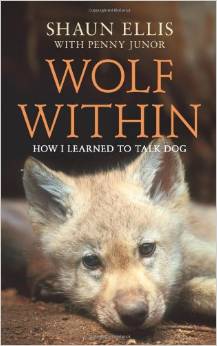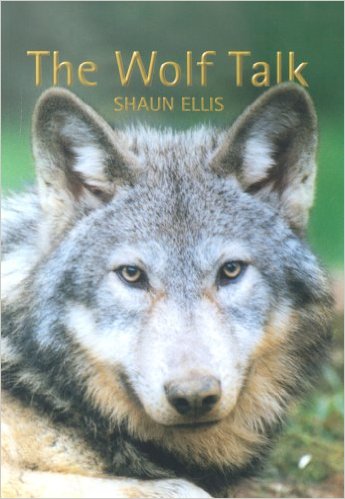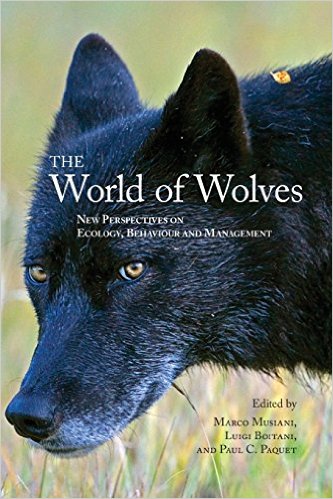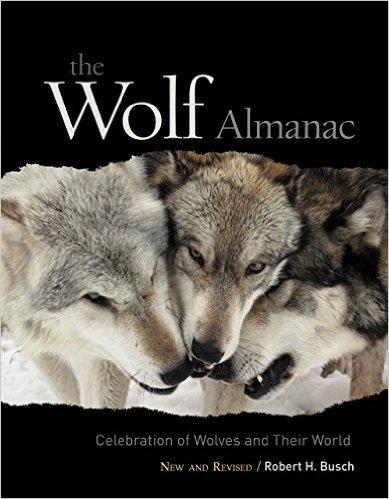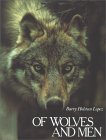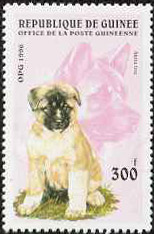Books on Dogs
Origins, canine evolution and wolves
If you want to buy a book, clicking on the book cover will take you directly to that book on the Amazon.co.uk web site.
See also:

The Wolf Within
If you haven´t read any Shaun Ellis, this is the book to start with. If you have, you may already know this book under its original title, The Man Who Lives With Wolves, which has now been published again under this new title. So beware, this isn't a new book of his, just a new title!
Shaun Ellis came from Norfolk, England, and travelled to the US, where he studied wolves. He decided to live a very spartan life among wolves back in England, and this is his story, with observations of what he has seen. He links wolf behaviour with that of dogs. While what he says is very interesting, it's worth remembering that dogs do differ from wolves in many ways, and some dogs are more wolf-like than others. This means that wolves don't provide all the keys to unlocking the mysteries of canine behaviour. However, it's a gripping tale which gives you many insights into wolves, and you can't help admiring Shaun Ellis´s grit and determination.

The Wolf Talk
Shaun Ellis spent two years living with a pack of wolves in the US, without being in touch with humans, and this experience gave him a very special understanding of wolves. He has two packs of wolves at a wildlife park in England, and spends his time with them. His life is a gripping adventure story for anyone fascinated by wild animals. His love of wolves, and dedication to the task of understanding them shine through in this book. This book came out after The Wolf Within, so continues the story - The Wolf Within was first published as The Man Who Lives With Wolves, so that is the one to start off with to see if you enjoy Shaun Ellis.

World of Wolves: New Perspectives on Ecology, Behaviour, and Management (Energy, Ecology, and the Environment)
This is a collection of case studies from different parts of the world, which is especially valuable, because much of the literature on wolves comes from the US, and less has appeared on wolves elsewhere. The contexts in which wolves live affect their behaviour, and this becomes obvious when you start looking at wolves in environments where livestock management practices vary according to human culture. This is a serious study, rather than a light read. If you want something about wolves that is easier to read, try Shaun Ellis, but if you have a serious interest in wolves, how they coexist with humans, evolution, and ecosystems, this book will interest you.

Biology and Conservation of Wild Canids
This book brings together research on a wide variety of wild canids, such as wolves, foxes and jackals, looking both at the dog family as a whole, and at single species. It is especially useful for readers interested in conservation, since many of the contributors are actively involved in efforts to conserve wild canid populations, such as wolf packs in the US. Readers will find a basic understanding of biology to be an advantage, but the writing is accessible to non-biologists wiho are interested in the dog family.

The Truth About Dogs: The Ancestry, Social Conventions, Mental Habits and Moral Fibre of Canis Familiaris
Stephen Budiansky may annoy you, but he is unlikely to bore you! He does actually love dogs, though he says some pretty rude things about them! His theories are often controversial, and also thought-provoking. One question he asks is why we put up with dogs, and he goes back to the start of dog-human relations to explain this. He also examines behavioural problems in the light of canine ethology and evolution. This is a very funny book, despite being based on some serious research.

Wolf Almanac [Illustrated] [Paperback]
Robert Busch has written perhaps the best account of wolves world wide - many wolf books focus mainly on the US, only giving a cursory mention to wolves elsewhere. He looks at the natural history of wolves including wolf behaviour, their place in local ecologies as predators, and their relationships with humans. There is also an account of wolf conservation issues. The book is packed with data for anyone interested in 'wolf facts', and it is also very well illustrated.

The Dingo: in Australia and Asia (Comstock Books)
The Dingo is sometimes described as a 'primitive dog', and its relationship with Australian aborigines is interesting because this can give many clues about the early relationship between humans and dogs. Australia now faces a conservation problem with the Dingo, which is of particular interest to Laurie Corbett, a researcher from the Tropica Ecosystems Research Centre, Darwin, Australia. This account of the Dingo will fascinate readers who are interested in canine ethology and evolution, as well as conservation issues, and aboriginal culture.

Of Wolves and Men
A classic book on wolves, mainly in the US, though there is also an account of wolves in Europe. There is a very interesting account of Native Americans and wolves, followed by a sad account of what came after North America was colonized by Europeans. This book is a gripping read both for people interested in wolves, and those who are interested in Native Americans. There is a lot on wolves in mythology, both Native American, and European. It's interesting on many levels, and well worth reading.

The Wolf: the Ecology and Behaviour of an Endangered Species
This edition of Mech's classic book on wolf ecology has an updated preface by the author. The book is based on a major research project carried out by Mech, and is of interest to ethologists and ecologists. It's also accessible enough for the general reader who just loves wolves. You can gain insights about wolf behaviour as well as ecology - though not all these insights are applicable to our pampered 'designer wolves'!.

Wolves: Behavior, Ecology and Conservation
David Mech's work on wolves has had a major impact on how wolves are perceived, and in popularising wolf conservation. This book is his latest offering, which came out in Nov 2003. Mech and Luigi Boitani provide a comprehensive update of current knowledge on wolf biology. The book tends to focus more on the North American than the European experience, but is thorough enough to become a standard text for some decades. It is accessible to a general readership, as well as scientists working in this field.

A History of Dogs in the Early Americas
Marion Schwartz is an academic researcher who has set out an account of canine history in the Americas which may put off many dog lovers, since it contains accounts of dogs being ritually sacrificed and eaten. Humans were also sacrificed and eaten, so these societies weren't especially anti-dog. You can skip the dog cuisine material if you find it too upsetting. Otherwise, the book is a fascinating read. It draws on a number of sources, and is thoroughly researched. The account of the role of dogs in the mythology of these societies is very interesting, both for dog lovers, and for people interested in mythology. The book is also very well illustrated.
Latest book reviews
Latest news and research
- Impact of facial conformation on canine health: corneal ulceration
- Prevalence of disorders recorded in dogs attending primary-care veterinary practices in England
- Disease control through fertility control: secondary benefits of animal birth control in Indian street dogs.
- Quantifying sources of environmental contamination with Toxocara spp eggs.
- Clostridium difficile in faeces from healthy dogs and dogs with diarrhea
- Impact of canine overweight and obesity on health-related quality of life
- Effect of a diet enriched with green-lipped mussel on pain behavior and functioning in dogs with clinical osteoarthritis
- Short, unstructured session with a dog reduces anxiety levels in students, and improves their mood
- Research suggests canine companionship helps calm children undergoing cancer treatment
- Dingoes in the dock
Care and behaviour of dogs
- Acknowledgments and further reading
- Aggression
- Appetite Loss
- Attention Seeking
- Barking
- Basic training
- Behavioural problems
- Behavioural problems in dogs
- Being sensible with traffic
- Bitches In Season
- Biting
- Canine Social Cognition, part 1: Dogs are special
- Canine Social Cognition, part 2: Differences between dogs
- Chasing Cars, Bikes, Joggers, Cats etc.
- Choosing a dog
- Coming when called
- Designing and using a dog garden
- Destructiveness
- Do you want your pet dog to have puppies?
- Dogs and diet
- Dogs don’t bite humans
- Dogs: Bringing up your puppy
- Dogs: Helping dogs with sound phobias, and fear of fireworks
- Fighting
- Finding a good training class
- Greeting guests politely
- Jealousy
- Jumping Up
- Learning that some animals are prey, others are not
- Mounting
- Multi-dog households: Enjoying life with more than one dog
- Phobias
- Poo Eating
- Possessiveness
- Recall
- Respecting other dogs in the household
- Respecting passers-by, human and canine
- Separation Anxiety
- Stealing
- There are acceptable and unacceptable places to perform (housetraining)
- Toilet Training
- Travelling safely in cars
- Using Flexileads safely
- Vet Phobias
- Walking nicely on the lead
- Walking On The Lead
- Wolves, Dogs and Humans

